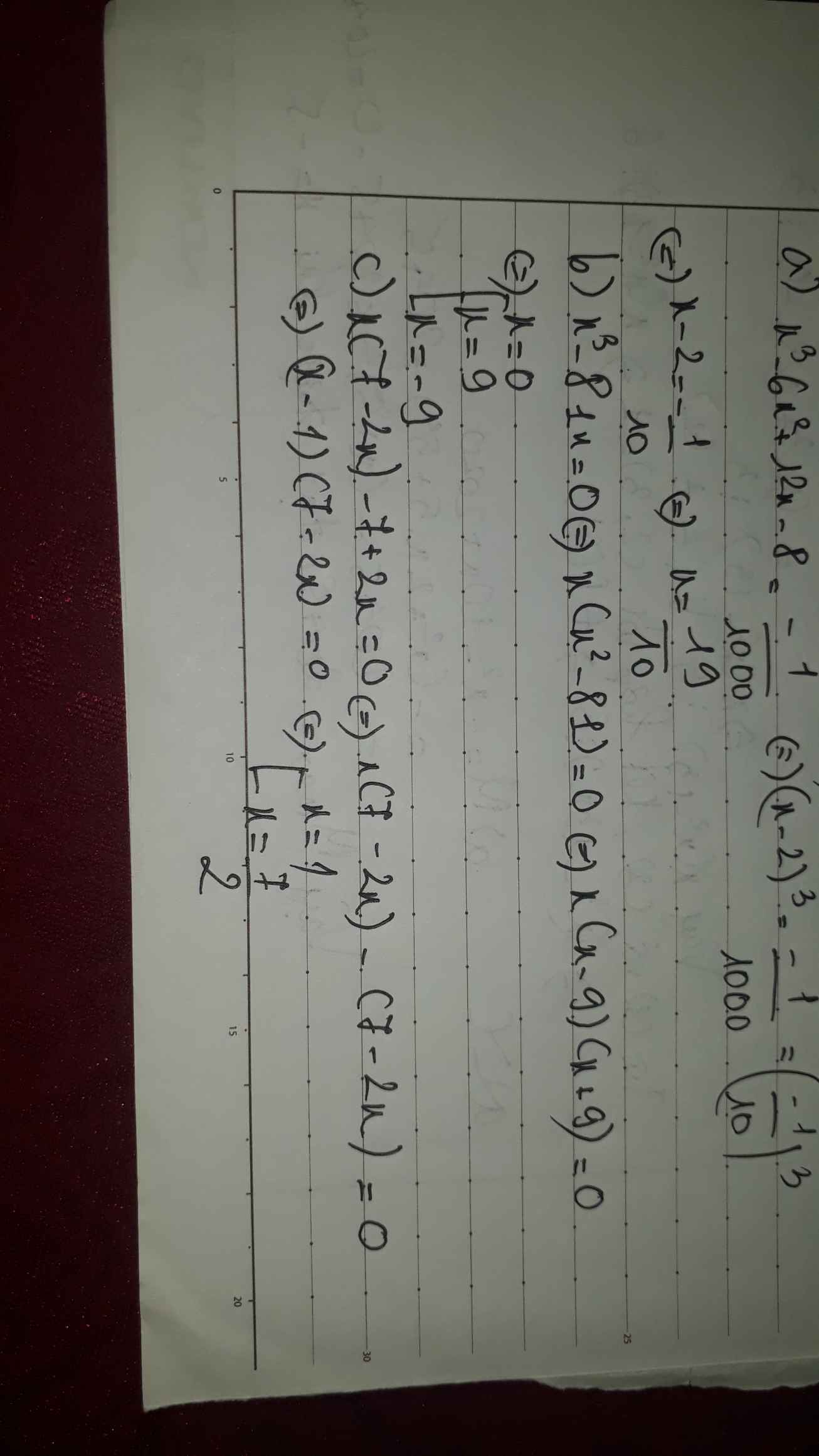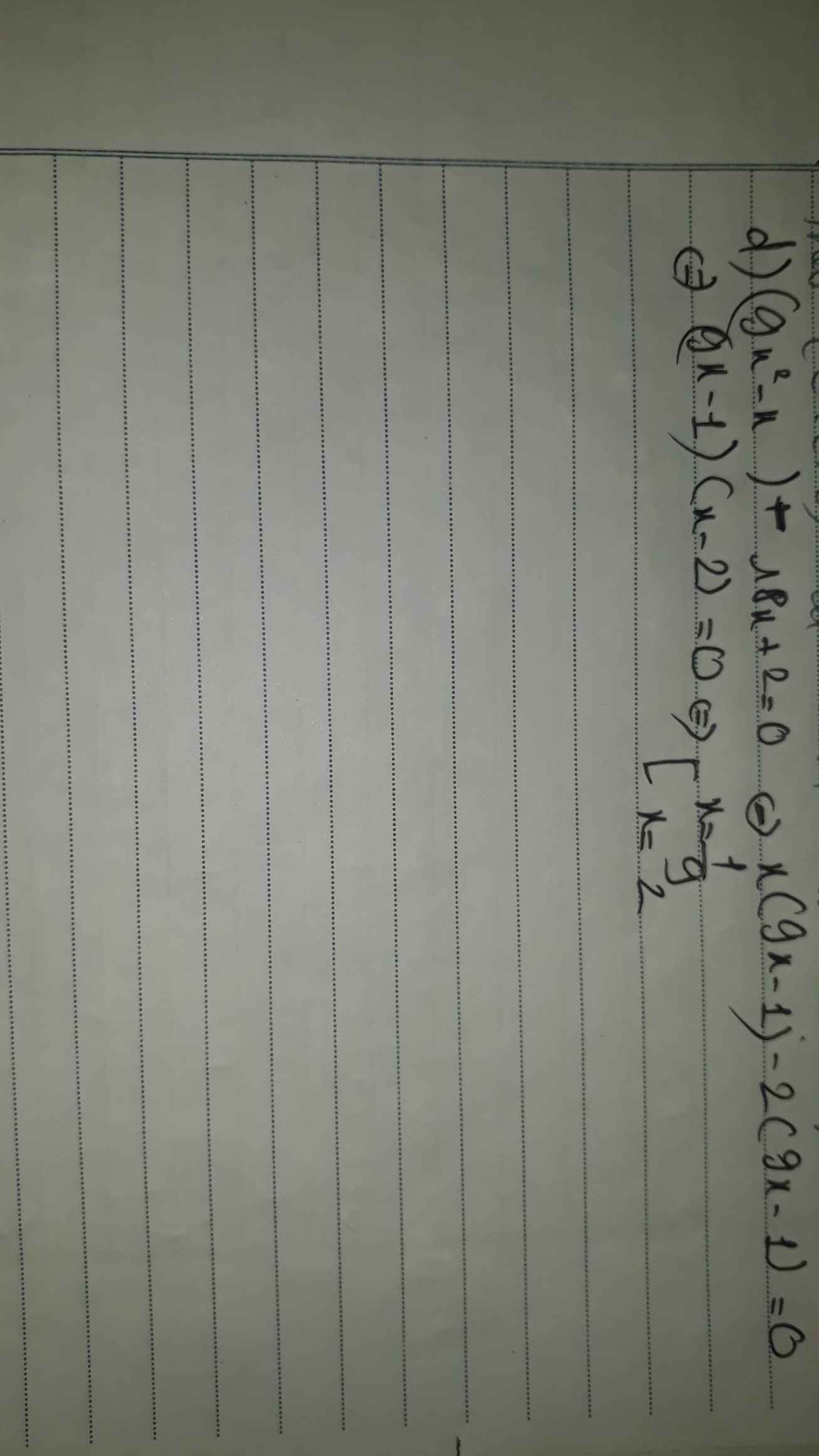Chứng minh 9x2 -12x+1\(\ge\)-x3 với \(\forall\)x
Hãy nhập câu hỏi của bạn vào đây, nếu là tài khoản VIP, bạn sẽ được ưu tiên trả lời.


a: \(A=\left(x^2-7x+6\right)\left(x^2-7x+12\right)+9\)
\(=\left(x^2-7x\right)^2+18\left(x^2-7x\right)+81\)
\(=\left(x^2-7x+9\right)^2>=0\)
b: Vì A=(x^2-7x+9)^2
nên A là số chính phương

a: 49x^2-25=0
=>(7x-5)(7x+5)=0
=>7x-5=0 hoặc 7x+5=0
=>x=5/7 hoặc x=-5/7
b: Đề thiếu vế phải rồi bạn
c: (3x-2)^2-9(x+4)(x-4)=2
=>9x^2-12x+4-9(x^2-16)=2
=>9x^2-12x+4-9x^2+144=2
=>-12x+148=2
=>-12x=-146
=>x=146/12=73/6
d: x^3-6x^2+12x-8=0
=>(x-2)^3=0
=>x-2=0
=>x=2
e: x^3-9x^2+27x-27=0
=>(x-3)^3=0
=>x-3=0
=>x=3
a) \(-25+49x^2=0\)
\(\Leftrightarrow49x^2-25=0\)
\(\Leftrightarrow\left(7x\right)^2-5^2=0\)
\(\Leftrightarrow\left(7x-5\right)\left(7x+5\right)=0\)
\(\Leftrightarrow\left[{}\begin{matrix}7x-5=0\\7x+5=0\end{matrix}\right.\)
\(\Leftrightarrow\left[{}\begin{matrix}7x=5\\7x=-5\end{matrix}\right.\)
\(\Leftrightarrow\left[{}\begin{matrix}x=\dfrac{5}{7}\\x=-\dfrac{5}{7}\end{matrix}\right.\)
b) \(16x^2-25\left(x-2\right)^2=0\)
\(\Leftrightarrow\left(4x\right)^2-\left[5\left(x-2\right)\right]^2=0\)
\(\Leftrightarrow\left(4x-5x+10\right)\left(4x+5x-10\right)=0\)
\(\Leftrightarrow\left(10-x\right)\left(9x-10\right)=0\)
\(\Leftrightarrow\left[{}\begin{matrix}10-x=0\\9x=10\end{matrix}\right.\)
\(\Leftrightarrow\left[{}\begin{matrix}x=10\\x=\dfrac{10}{9}\end{matrix}\right.\)
c) \(\left(3x-2\right)^2-9\left(x+4\right)\left(x+4\right)=2\)
\(\Leftrightarrow9x^2-12x+4-9\left(x^2+8x+16\right)=2\)
\(\Leftrightarrow9x^2-12x+4-9x^2-72x-144=2\)
\(\Leftrightarrow-84x-140=2\)
\(\Leftrightarrow-84x=142\)
\(\Leftrightarrow x=-\dfrac{142}{84}\)
\(\Leftrightarrow x=-\dfrac{71}{42}\)
d) \(x^3-6x^2+12x-8=0\)
\(\Leftrightarrow x^3-3\cdot2\cdot x^2+3\cdot2^2\cdot x-2^3=0\)
\(\Leftrightarrow\left(x-2\right)^3=0\)
\(\Leftrightarrow x-2=0\)
\(\Leftrightarrow x=2\)
e) \(-27+27x-9x^2+x^3=0\)
\(\Leftrightarrow x^3-9x^2+27x-27=0\)
\(\Leftrightarrow\left(x-3\right)^3=0\)
\(\Leftrightarrow x-3=0\)
\(\Leftrightarrow x=3\)

a) Ta có: \(x^3+x^2+4\)
\(=x^3+2x^2-x^2+4\)
\(=x^2\left(x+2\right)-\left(x+2\right)\left(x-2\right)\)
\(=\left(x+2\right)\left(x^2-x+2\right)\)
b) Ta có: \(9x^2+12x-5\)
\(=9x^2+15x-3x-5\)
\(=3x\left(3x+5\right)-\left(3x+5\right)\)
\(=\left(3x+5\right)\left(3x-1\right)\)
c) Ta có: \(x^4+1997x^2+1996x+1997\)
\(=x^4+x^2+1+1996x^2+1996x+1996\)
\(=\left(x^4+2x^2+1-x^2\right)+1996\left(x^2+x+1\right)\)
\(=\left[\left(x^2+1\right)^2-x^2\right]+1996\left(x^2+x+1\right)\)
\(=\left(x^2+x+1\right)\left(x^2-x+1\right)+1996\left(x^2+x+1\right)\)
\(=\left(x^2+x+1\right)\left(x^2-x+1997\right)\)
d) Ta có: \(x^2-x-2001\cdot2002\)
\(=x^2-2002x+2001x-2001\cdot2002\)
\(=x\left(x-2002\right)+2001\left(x-2002\right)\)
\(=\left(x-2002\right)\left(x+2001\right)\)

Ta có: \(\frac{x-2}{\sqrt{x-1}+1}\)
\(=\frac{x-1-1}{\sqrt{x-1}+1}\)
\(=\frac{\left(\sqrt{x-1}-1\right)\left(\sqrt{x-1}+1\right)}{\sqrt{x-1}+1}\)
\(=\sqrt{x-1}-1\)
Ta có: \(\sqrt{x-1}\ge0\forall x\) thỏa mãn ĐKXĐ
\(\Leftrightarrow\sqrt{x-1}-1\ge-1\forall x\) thoả mãn ĐKXĐ
\(\Leftrightarrow\frac{x-2}{\sqrt{x-1}+1}\ge-1\forall x\ge1\)(đpcm)

1)
a) \(=15x^3-20x^2+10x\)
b) \(=3x^4-x^3+4x^2-9x^3+3x-12x=3x^4-10x^3+4x^2-9x\)
2)
a) \(\Rightarrow x\left(x^2-6x+12\right)=0\)
\(\Rightarrow x=0\)(do \(x^2-6x+12=\left(x^2-6x+\dfrac{36}{4}\right)+3=\left(x-\dfrac{6}{2}\right)^2+3\ge3>0\))
b) \(\Rightarrow\left(x+3\right)^3=0\Rightarrow x=-3\)
(3x²-5x+2)+(3x²+5x)= bao nhiêu ạ
Giúp em vs ạ . Em cảm ơn

a) Ta có:
\(x^2+4x+5\)
\(=x^2+2.x.2+4+1\)
\(=\left(x+2\right)^2+1\)
Vì \(\left(x+2\right)^2\ge0\forall x\)
\(\Rightarrow\left(x+2\right)^2+1>0\forall x\)
\(\Rightarrow x^2+4x+5>0\forall x\)
b) Ta có:
\(x^2-x+1\)
\(=x^2-2.x.\dfrac{1}{2}+\dfrac{1}{4}-\dfrac{1}{4}+1\)
\(=\left(x-\dfrac{1}{2}\right)^2+\dfrac{3}{4}\)
Vì \(\left(x-\dfrac{1}{2}\right)^2\ge0\forall x\)
\(\Rightarrow\left(x-\dfrac{1}{2}\right)^2+\dfrac{3}{4}>0\forall x\)
\(\Rightarrow x^2-x+1>0\forall x\)
c) Ta có:
\(12x-4x^2-10\)
\(=-\left(4x^2-12x+10\right)\)
\(=-\left[\left(2x\right)^2-2.2x.3+9+1\right]\)
\(=-\left(2x-3\right)^2-1\)
Vì \(-\left(2x-3\right)^2\le0\forall x\)
\(\Rightarrow-\left(2x-3\right)^2-1< 0\forall x\)
\(\Rightarrow12x-4x^2-10< -1\)

a) \(9x^2-6x+11=\left(3x\right)^2-2.3x+1+10=\left(3x-1\right)^2+10>0\forall x\)
b) \(3x^2-12x+81=3.\left(x^2-4x+9\right)=3.\left(x-2\right)^2+15>0\forall x\)
c) \(5x^2-5x+4=5.\left(x^2-x+\dfrac{4}{5}\right)=5.\left(x^2-x+\dfrac{1}{4}+\dfrac{11}{20}\right)=5.\left(x-\dfrac{1}{2}\right)^2+\dfrac{11}{4}>0\forall x\)
d) \(2x^2-2x+9=2.\left(x^2-x+\dfrac{9}{2}\right)=2.\left(x-\dfrac{1}{2}\right)^2+\dfrac{17}{2}>0\forall x\)

